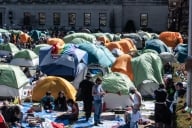You have /5 articles left.
Sign up for a free account or log in.
It was a fair start, for an ironical life, to be born American in Saigon, Vietnam, on Ho Chi Minh’s birthday. I’m told the Vietnamese nurses at my delivery giggled furiously. The war was building then, so my family stayed only six more months, but Vietnam has always been part of us. The little Fauntleroy at left is, of course, me, age three, and there’s something suspiciously Gallic about my clothes, as if my mother thought of me as the last of the Indochinese colonials.
It was a sort of neocolonial life, after all. We lived in a new subdivision across from Tan Son Nhut Airport built especially for foreign contractors, diplomatic staff, military families, and aid workers. Housing was already at a premium then, due to the buildup, and while there were some lovely old French-built homes in the city center, utilities were suffering. The city water had been fine as long as pressure was maintained in the antiquated pipes, but people began using booster pumps to draw more water into buildings, creating a negative pressure that drew in waste from the similarly old French sewers.
The subdivision was called JDP compound and was owned and operated by the U.S. Embassy. Single-family homes were built on stilts, over carports, and had big backyards. There was no rent. We had a maid who also cooked meals, and a driver we shared with other residents. My pigtailed sister had a pet monkey and rode to school in a bus with grenade screens over the windows, though the compound itself had no walls around it. My mom said my dad kept a small pistol in the nightstand in case of guerilla attack, but she laughed that he was such a sound sleeper that they would have carried him off without him waking.
My dad had been sent to Vietnam—as he was to be sent to Afghanistan later—by Southern Illinois University Carbondale, as part of an Agency for International Development (USAID) team. In Saigon, he was assigned to Phu Tho National Institute of Technology. He got around “quite a bit,” flying by 4-person Pipers to cities in the Delta to help small industry, never driving in the countryside. There were many AID people there then. SIUC alone had some 20 advisers, including those shaping curriculums in the schools.
There were many foreigners teaching English in Saigon, too, including my mom, who’d been an elementary teacher stateside. English had become the language of ambition, since many of the best-paying jobs aided the American presence. My mom loved her job and Saigon, that old Paris of the Orient, which she rarely got to leave. She spent her spare time seeing the sights and shopping the stores and markets downtown and in Cholon, the ethnic Chinese district. She claimed to have seen the monk Thich Quang Duc immolate himself, and she told of hiding under the houses at JDP with other families when spent bullets fell after missing the airplanes of rebelling South Vietnamese pilots dropping 400-pound bombs on their own Presidential Palace.
One might have expected her to remember Vietnam exclusively in terms of what the Vietnamese called “The American War.” But she spoke most often of the people she knew, and then of the beauty of the land. Vietnam itself—not her privilege in it—was something my mother never got over, never stopped remembering. After the war, it was closed to Americans and became a place of the mind for many of us. My mom had her memories, Kodak slides, and exquisite souvenirs, such as her collection of conical hats and my wicker baby carriage with wooden wheels. She also had us volunteer at SIU and in our hometown to help refugees after 1975.
No surprise, then, I’ve had a lifelong interest in the people, culture, and landscape of Vietnam. But it wasn’t until I was in my early 30s, just before official U.S. rapprochement, that my friend Frenchy and I had a chance to visit, backpacking from Saigon to Hanoi and back. It felt odd to get off the airliner from Seoul in the middle of the night, disoriented with jetlag and culture shock, and to be greeted with the sight of dozens of Vietnamese waiting silently behind the fence outside customs, as they’d been portrayed in the media during the fall of South Vietnam. But these families were simply waiting for relatives returning from abroad, and for a second I pretended I too was coming home.






